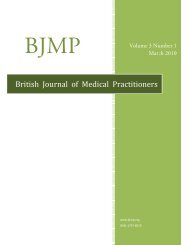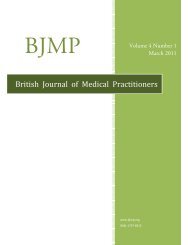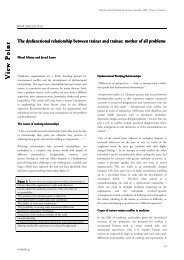R esearch A rticle - British Journal of Medical Practitioners
R esearch A rticle - British Journal of Medical Practitioners
R esearch A rticle - British Journal of Medical Practitioners
Create successful ePaper yourself
Turn your PDF publications into a flip-book with our unique Google optimized e-Paper software.
<strong>British</strong> <strong>Journal</strong> <strong>of</strong> <strong>Medical</strong> <strong>Practitioners</strong>, March 2013, Volume 6, Number 1<br />
Impulse control disorders<br />
Epidemiology<br />
A large multi-centre investigation (the DOMINION study) <strong>of</strong><br />
3,090 patients with PD revealed that impulse control disorder<br />
(ICD) was identified in 13.6% <strong>of</strong> PD patients; specifically,<br />
pathological gambling in 5%, compulsive sexual behaviour in<br />
3.5%, compulsive buying in 5.7% and binge-eating disorder in<br />
4.3%. 50 The prevalence <strong>of</strong> ICD rises to 14% for patients taking<br />
dopamine agonists, compared with 0.7% for patients taking<br />
levodopa alone. 51 It is not clear whether these ICD symptoms<br />
reflect a primary pathology <strong>of</strong> PD or whether dopaminergic<br />
medication is interacting with an underlying predisposition or<br />
vulnerability. 52 Possible neurobiological explanation centres<br />
around dopamine-receptor binding pr<strong>of</strong>iles. Dopamine D2 and<br />
D1 receptors, abundant in the dorsal striatum, may mediate the<br />
motor effects <strong>of</strong> dopamine replacement therapies, whereas D3<br />
receptors are abundant in the ventral striatum, a brain region<br />
associated with addictive behaviour and substance misuse<br />
disorders. Second generation non-ergot dopamine agonists (e.g.<br />
pramipexole and ropinirole) demonstrate relative selectivity for<br />
D3 receptors compared with D2 and D1 receptors. 50<br />
Aetiology and risk factors<br />
Addiction to dopaminergic medication used in the treatment <strong>of</strong><br />
PD may explain behaviours such as drug-seeking, gambling,<br />
and hypersexuality. The risk <strong>of</strong> pathological gambling increases<br />
if dopamine agonists are used in those with younger age <strong>of</strong><br />
onset, higher novelty seeking traits, and a personal and family<br />
history <strong>of</strong> alcohol misuse. 53<br />
Presentation and diagnosis<br />
In addition to the above PD patients with ICD may present<br />
with compulsive shopping, compulsive eating, and compulsive<br />
medication use, all <strong>of</strong> which can have potentially devastating<br />
psychosocial consequences because they are <strong>of</strong>ten hidden.<br />
Complex stereotyped repetitive behaviours (punding) may also<br />
be present. 54 Punding behaviour is stereotyped and purposeless<br />
and includes hoarding, shuffling papers, sorting labels,<br />
assembling and disassembling objects, to name a few.<br />
Treatment<br />
Stopping dopaminergic medication should be considered in the<br />
first instance. Further treatment options are limited but one<br />
double-blind crossover study demonstrated the use <strong>of</strong><br />
amantadine in abolishing or reducing pathological<br />
gambling. 55 In addition, one case report suggested the<br />
antipsychotic quetiapine to be effective in treating pathological<br />
gambling. 56 Whether other treatments, such as DBS, are<br />
effective for these compulsive repetitive behaviours, remains to<br />
be seen.<br />
Management <strong>of</strong> overlooked neuropsychiatric syndromes in PD<br />
Because <strong>of</strong> the significant disability and impact on quality <strong>of</strong> life<br />
caused by overlooked neuropsychiatric symptoms in PD, it is<br />
important for neurologists and psychiatrists to recognise them<br />
and develop their clinical skills in order to be aware <strong>of</strong> their<br />
significance. Early detection is crucial. We have shown there is a<br />
limited range <strong>of</strong> treatment strategies available to guide the<br />
clinician in treatment choices. Because neuropsychiatric<br />
diagnoses in PD are different in phenomenology it is important<br />
to remember that treatment with 'psychiatric' drugs will <strong>of</strong>ten<br />
be insufficient and therefore more consideration should be<br />
given to 'antiparkinsonian' medications because the underlying<br />
pathology <strong>of</strong> PD is causing the various syndromes mentioned.<br />
Table 3 provides an overview <strong>of</strong> the medical treatment <strong>of</strong><br />
overlooked neuropsychiatric syndromes in PD, although it<br />
should be noted that overall very few studies document the<br />
effectiveness <strong>of</strong> the solutions proposed and more controlled<br />
studies are needed. Nonetheless, the reader should find the<br />
following useful.<br />
Table 3. Summary <strong>of</strong> the medical treatment <strong>of</strong> overlooked<br />
neuropsychiatric syndromes in Parkinson’s Disease.<br />
Psychiatric syndrome Treatment<br />
Anxiety<br />
Apathy (diminished<br />
motivation)<br />
Involuntary<br />
emotional expressive<br />
disorder<br />
Sleep disorders<br />
Impulse control<br />
disorders<br />
- Antidepressants - sertraline, citalopram,<br />
fluoxetine, venlafaxine- Others - antipsychotics,<br />
benzodiazepines<br />
- Cognitive Behavioural Therapy<br />
- Exercise<br />
- Cholinesterase inhibitors<br />
- Dopamine agonists<br />
- Possible use <strong>of</strong> methylphenidate<br />
- Antidepressants<br />
- Dopaminergic agents.<br />
- Possible combination <strong>of</strong> dextromethorphan<br />
and quinidine<br />
Conclusion and implications<br />
- Benzodiazepine - clonazepam<br />
- Antipsychotic (sedating) – quetiapine<br />
- Sleep hygiene<br />
- Possible use <strong>of</strong> amantadine or quetiapine in<br />
pathological gambling<br />
- Further r<strong>esearch</strong> required<br />
The management <strong>of</strong> PD is <strong>of</strong>ten complicated because <strong>of</strong> the<br />
diverse factors underlying its aetiology. Dopaminergic,<br />
serotonergic, noradrenergic and cholinergic pathways are<br />
involved. 57 Clinicians are generally competent in recognising<br />
the more common disorders such as depression, psychosis and<br />
cognitive impairment associated with PD though there is a<br />
tendency to focus too much on these at the expense <strong>of</strong> other<br />
nonmotor symptoms. Anxiety, apathy, involuntary emotional<br />
expression disorder, sleep disorders, and impulse control<br />
BJMP.org<br />
27







